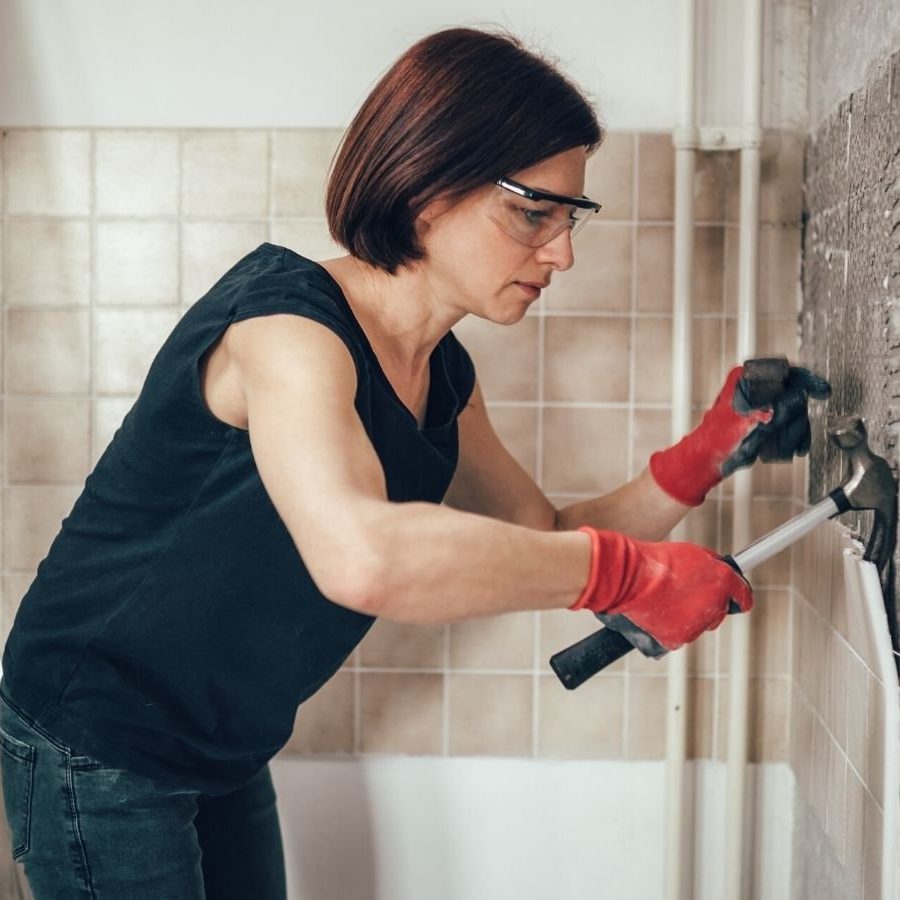Are you thinking of selling your home in the near future but when you look around you see so many things that may overshadow your homes shine? You know that kitchens and bathrooms sell homes, and home buyers usually want to see these items completed before they move in, unless they are buying a house for a great price expecting to need to renovate it. And the trick to deciding whether or not to renovate is to figure out which category your home will fall under.
Renovations That Always Pay When Selling a House
There are renovations that pay, those that will add some value, and those to avoid. The key lies in the difference between what buyers like and what they’ll actually pay for. Here is a list of renovations that always pay:
General Repairs
Leaving your home in disrepair will not look good when a potential buyer comes to view it. Buyers will think that if you can’t be bothered to repair a broken hinge, what else could you be leaving undone, giving them the overall feeling of a neglected home. Fix anything that is broken no matter how minor it may seem.
Fresh Paint in Neutral Colors
Most buyers want to walk through and imagine their furniture in your home. A bold color on the walls could make it difficult for them to see past it and imagine themselves living there.
Decluttering & Professional Cleaning
This is not technically a renovation, but it is a very important first step in selling your home and should not be underestimated. This will help your property feel fresh and as new as possible, and will help buyers imagine themselves living in it.

Other Renovations To Consider When Selling a House
The rest of the renovations that you may be considering will need to be decided on individually. This is where your REALTOR® will be a big help deciding whether or not these renovations will pay off, depending on the overall standard for the rest of the neighborhood and for homes in a similar price range, as well as how seriously out of date your home may be currently.
Kitchen Overhauls
Almost everyone wants a great kitchen and would prefer not to have to either live through a kitchen renovation or wait to move in while the renovation is taking place. Be very careful, though, if you do decide to take on this renovation as styles are always changing and people's tastes are different. If you do decide that a kitchen renovation is in order, it’s better to keep it minimal. You may be able to recoup the costs of a new faucet and updated backsplash, but you won’t necessarily see the return for a complete rebuild with new counters and cabinets.

Bathroom Renovations
Bathroom renovations face the same challenges as the kitchen remodel—you will never really see the money you put into them, unless it’s absolutely in dire need of it. You’re better off doing a deep clean of what you have, adding a fresh coat of paint to the walls, and calling it a day.
Landscaping
Do not put a lot of time, effort and money into any landscaping project if you are planning on selling in the near future. For the most part, people are interested in a good, safe outdoor space. They may like to look at a beautifully landscaped year with flower beds and shrubs, but most people do not have the time, gardening skills, or desire to maintain it. Having a low-maintenance and easy-to-care-for space will be far more desirable than one that looks great but will require a lot of upkeep.
Home Fundamentals
A home's fundamentals are important—roofing, plumbing, electrical, heating, and cooling. Buyers want not only functioning equipment but also will appreciate knowing these items won’t have to be replaced in the near future. If they need to be fixed, you should definitely replace them but don’t expect to recoup the cost.
When it comes to any renovation questions you may have, the best advice I can give you is to talk to a REALTOR®. Since there are so many variables regarding whether or not a specific renovation will be worth it, there really is no way of knowing other than to have a good understanding of the market and what current buyers are looking for. We know which renovations will increase the value of your home and will be happy to provide some insight into your local real estate market that could influence your decision—whether or not you get your investment back, when you are selling, etc. Ask me for a free comparative market analysis and let’s about your renovation to-do list today!

Too often, people rush into buying a house when they’re not ready. Just because you’re sick of renting does not mean you should automatically buy a home thinking it’s the only alternative. Being sick of renting is most definitely a better alternative to buying and ending up with your finances in a mess or with a home that doesn’t fit your needs.
Owning a home is a big commitment, it’s not a guaranteed investment, and it’s a truckload of work. It can be a smart long-term move, but you want to know what you’re getting into. The following tips for buying a home are here to help you get started:
1) Know Your Credit Score
Your credit score is one of the biggest factors in what your loan terms will be. Know your score before you ever try to get a loan, and take the time to repair it if it's too low.
2) Get Pre-Approved for a Mortgage
A mortgage pre-approval means you should be able to get the loan, so long as nothing changes about your financial situation or your credit score. A pre-approval letter also helps when you want to compete with another buyer for a home you love. One of the first things most sellers will ask their agent when receiving offers is how qualified the home buyers are to purchase.
3) Research the Costs of Buying a House
There are a lot of fees that come with a home purchase, above and beyond the mortgage. Insurance, repairs, association fees, property taxes—you should have the income and the budget to handle all of these things if they are relevant to your purchase.
4) Work With an Experienced REALTOR®
Real estate agents are licensed professionals who work on your behalf and advocate for your interests. In most cases, sellers have a real estate agent working for them, so you’ll want someone on your side—a buyer’s agent—who also has your back in negotiations and can help you understand how to make an offer on a home. But that’s not all! Your agent will also help you find homes that match your budget and needs, provide facts on a neighborhood, negotiate an offer, navigate the home inspection, decipher paperwork, and request and review seller disclosures.

5) Understand the Value of the Property You are Offering On
Working with a real estate agent that understands market values in your local area is critical if you want to avoid overpaying for your house.
6) Verify All Information on the Listing
Another crucial thing to do before buying a house is to make sure the house listing is accurate. It would be best if you verified that all the information given about the home is right. Sometimes real estate agents put things in the listing that they may not have verified or may just not be aware of the facts.

7) Use an Experienced Home Inspector
The home inspection is one of the most vital aspects of buying a home. You will want to have someone performing it who is thorough and complete.
8) Check Previous Permits
If a renovation was done without a permit, it might not have been done right. No permit means that the work was not reviewed by an inspector, something you do not want in your new home.
9) Don’t Sacrifice on Location
Remember: you can change the flooring and even the layout of a home, but you can never change its location.
10) Don’t Do Anything to Affect Your Financial Situation
Your mortgage pre-approval is based on the information given at the time of your application. Any changes, like getting a different job or taking out a car loan, can result in denial of the loan request when purchasing a house.
Then the last piece is making sure that the house is in great shape when it gets on the market. I have all sorts of connections for that—painters and stagers and people that can help with decluttering or anything that needs to be done. And I can give my piece of advice, too, as we walk through the home and help that seller decide what needs to be done before we get that on the market.
These tips should help put you on the path to filling in your home-buying knowledge. Remember: that the more you educate yourself about the process beforehand, the less stressful it will be, and the more likely you will be to get the house you want for a price you can afford. But that doesn’t mean you have to go it alone! With my help and guidance, you can always feel sure that you are informed and guided along the way!


